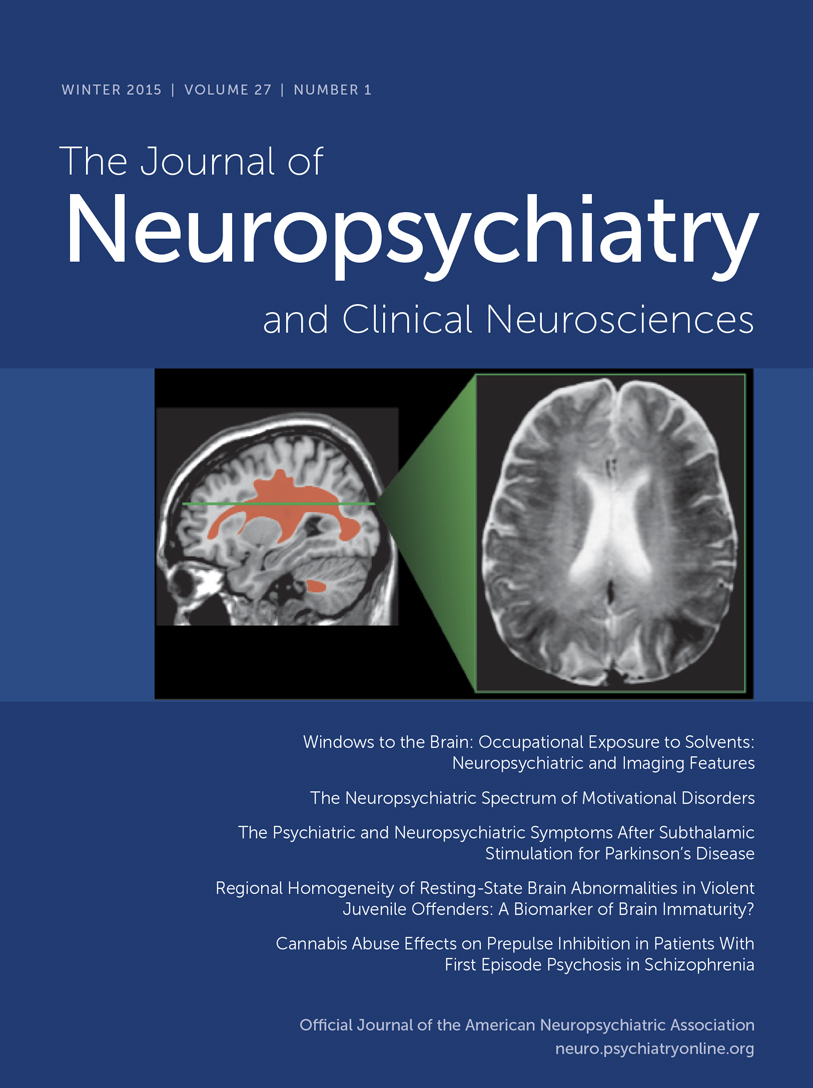Dengue Fever-Associated Catatonia
To the Editor: Dengue fever is an arbovirus mosquito borne infection, endemic in many countries. It varies from mild to severe form; the severe forms include shock and hemorrhagic fever. Though neurological manifestations have been reported to be associated with dengue infection (more so with severe forms), psychiatric manifestations have been less commonly reported. To the best of our knowledge, there has been only one previous case report of catatonia in association with dengue fever.1 Here, we report a 16-year-old boy who during an acute dengue infection developed catatonia.
Case Report
A 16-year-old adolescent boy, a student of the 9th grade, was brought to the emergency department of Kalpana Chawla Government Medical College with a 2-day history of not speaking, not eating, staring at vacant places, standing for long periods of time in one posture, and decreased sleep. He had not passed urine for the last 24 hours. He had history of fever for last 5 days for which the patient took tablet paracetamol only. There was no history of tuberculosis, diabetes, hypertension, substance use, seizures, neck rigidity, altered sensorium, violent abusive behavior or of cough, loose motions, or bleeding from any site. His past, personal and family history was noncontributory.
On examination, his pulse was 98 beats/minute and blood pressure 110/80 mm Hg in right arm supine position. He was febrile with temperature 100°F. Suprapubic tenderness was present. Further examination revealed vacant staring gaze, mutism, and posturing. No other catatonic symptoms were elicited. Rest of neurological examination was within normal limits (WNL). A probable diagnosis of fever with catatonia was made with cause under evaluation. Foley’s catheter was inserted and urine drained. His blood work-up, including hemogram, total and differential leukocyte counts, liver function tests, kidney function tests, and blood sugar and serum electrolytes were WNL. Widal test and peripheral blood film for malaria were negative. His platelet counts were 92,000 ccmm. Dengue serology including Ag IGM and IGG were reactive. His ECG, abdominal ultrasound, and computed tomographic (CT) scan of the head were normal. He was given an injection of lorazepam 4 mg i.v. slow stat. He was also started on i.v. antibiotic ceftriaxone 1 gm BD, tablet paracetamol 500 mg on an as needed basis, and tablet lorazepam 4 mg per day in divided doses. A diagnosis of dengue fever-associated catatonia was made. His catatonic symptoms improved, and his fever also subsided. His platelet counts also improved with at the time of the last report completed 5 days after admission (2.32 lacs/cumm). Foley’s catheter was removed, and he was passing urine comfortably. He was subsequently discharged and has been maintaining well since then. His antibiotics were stopped and lorazepam was tapered over a period of 2 weeks. He has been maintaining well with no symptom recurrence on follow-up
Discussion
Our patient was diagnosed as organic catatonic syndrome (F06.1) as per ICD-102 with dengue infection as the probable etiology. This was considered keeping in view of temporal relationship between the onset of dengue fever and emergence of catatonic symptoms. Also, the patient's past, personal, and family history was unremarkable. To the best of our knowledge, there was one previous report of catatonia in association with dengue infection.2 However, in that report, besides antibiotics, patient was given blood transfusions, olanzapine, and clonazepam for management. Studies have found depression and anxiety symptoms to be commonly associated with dengue infection.3,4 Also neurological manifestations in the form of encephalitis with confusion, seizures, and delirium have been reported, with prevalence ranging from 3%−21% in studies.5,6 Data on severe mental disorders associated with dengue infection is sparse. Our literature search revealed only one report of catatonia1 and few reports of mania associated with dengue infection,7–9 all from India. There is a need to systematically evaluate the prevalence, pattern, and risk factors for psychiatric disorders associated with dengue infection, especially in dengue endemic countries.
1 : Catatonia in a patient with Dengue fever. JK Pract 2007; 14:48Google Scholar
2
3 : A study of psychiatric symptomatology in Dengue patients. Delhi Psychiatry Journal. 2013; 16:21–23Google Scholar
4 : Anxiety and depression symptoms in patients with dengue fever and their correlation with symptom severity. Int J Psychiatry Med 2012; 44:199–210Crossref, Medline, Google Scholar
5 : Involvement of the central nervous system in patients with dengue virus infection. J Neurol Sci 2008; 267:36–40Crossref, Medline, Google Scholar
6 : Encephalitis and myelitis associated with dengue viral infection clinical and neuroimaging features. Clin Neurol Neurosurg 2008; 110:635–640Crossref, Medline, Google Scholar
7 : Classical mania associated with dengue infection. Indian J Med Sci 2006; 60:115–116Crossref, Medline, Google Scholar
8 : Organic mania in dengue. J Clin Diagn Res 2013; 7:566–567Medline, Google Scholar
9 : Mania in dengue fever. Ind Psychiatry J 2011; 20:56–57Medline, Google Scholar



